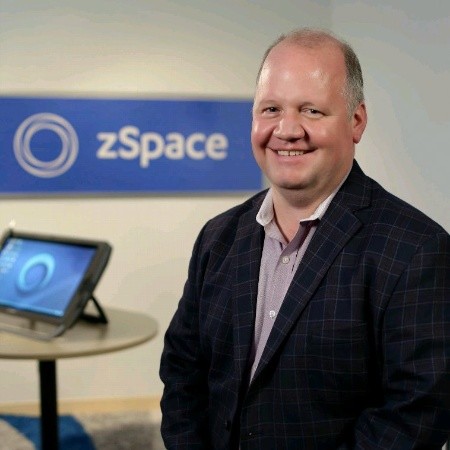Table of Contents
edCircuit makes a point of having its journalists, contributors, and strategic thought leader staff attend many of the more relevant education industry conferences to capture opinions and thought-provoking discussions with education industry participants and strategic leaders, edLeaders emPowering Education, where we discuss groundbreaking developments in education today. The edCircuit team recently caught up with Dr. Joseph Parlier, Director of Education at zSpace. while @ FETC 2023 in New Orleans, Louisiana. Joe works with teachers nationwide and internationally, looking to integrate augmented and virtual reality into teaching and learning in the classroom. In this conversation, Joe discusses zSpace’s unique positioning in the EdTech market, grade level applicability of AR/VR, professional proficiency, and more. This discussion is part of our ongoing edLeaders emPowering Education series, where we spotlight education leaders and their missions to emPower Education.
zSpace emPowering Education
Q: How long has Zspace been around?
A: Zspace has been in the education market for 8 to 9 years. Many people know about us from our original days as a larger all-in-one device where students would put on a pair of lightweight glasses that allowed interactions. But just a year ago at FETC in Orlando, we released the new Zspace Inspire. The world’s first laptop allows you to interact with content rendered in a 3D environment to create a virtual experience, and you don’t have to put glasses on. In fact, you don’t have to put anything on.
Grade Level Applicability
Q: What is the entry point for Zspace from a student grade perspective?
A: Believe it or not, we have elementary school students who can enter the environment, go into the desert, a place they might not otherwise be able to go, observe how animals interact, change day to night, and see how that impacts the way animals interact. They may want to go up to one of those animals to figure out what it is about the animal that allows it to survive in that space.
When you look at the standards the teachers have to teach, what we’ve done is use those standards to drive the development of our content so that we can give kids access to content in ways they’ve never had access before while meeting those academic standards that teacher or students are held accountable for that.
Turning Play Into Learning Opportunities
Q: What makes your product take exciting 3D play and transform it into a teaching and learning opportunity?
A: I think it goes to what I said earlier about letting students do things that they otherwise couldn’t do in the classroom, things that are too dangerous … Blowing up a light when they’re creating a closed or series circuit. But it’s also not just about the hardware and software we’ve built out. It’s building the lessons, activities, and simulations aligned with the standards so that, as a teacher, I know that while I have to accomplish this specific learning task, I have a tool that supports me.
Equally important is the professional development support that we provide to the teachers. This is not a matter of you giving them out, teachers go back, and they can easily integrate it. It’s more about the process of looking at what the curriculum has to be taught, identifying the activities and lessons that align with that curriculum, and then supporting the teachers who can embed it over time and get comfortable using it. And then it just becomes ubiquitous in terms of what the technology is.
Giving Students Opportunities for Professional Proficiency
Q: How do you deal with the objectives from school districts about the importance of hands-on learning, particularly from a CTE perspective?
A: Rather than seeing that as an objective, we see it as a strength of the program because it’s not about replacing it. But think about it like this: if I’m becoming an electrician and learning to wire something, what if I can start in a virtual space where I can fail? I can fail quickly, give feedback, and try again, but I’m not burning up materials, so I can practice until I reach a certain level of proficiency.
This supplements what they’re already doing and lets them take it to the next level. I mentioned I was a science teacher; if I went back to the classroom, I would still use my marbles and my pipe covers to build roller coasters. And now, I can come here to Newton’s Park, and I can replicate that, but I can do it on the moon, I can do it on Jupiter, and see how gravity in different places affects my data points. So, it’s not one or the other. It’s actually about taking what you’ve been able to do and expanding it in ways that let students be more creative thinkers, letting students see what would happen if so, they can be our future engineers and designers.
Creating Tangible Success in the Classroom
Q: Can you share an amazing success story or implantation that resonated with educators and students?
A: I think one of the most recent things that happened that really was almost moving from an emotional standpoint was a teacher in Atlanta public schools who got her new devices with automotive content on it. She had not even gone to training, but she had a student take a device out. She called that student the school’s terror. And she said that the student got off the Zspace device, realized he could learn more about the car engine, and it turned him around from an attendance perspective.
He engaged with his other teachers because before he could get into the Zspace experience and work with the content, he had to demonstrate that he was doing what he was supposed to do academically in other classes. But what she said to me that resonated was that this kid was going to drop out, and now he is interested in cars, learning how to do things with cars. He obtained a job in his community at a local tire company and now has a path with purpose.
To learn more about zSpace, visit their website and follow them on Twitter, Facebook, and LinkedIn.
Read parts one and two of this three-part Q&A series to hear from leading experts in education.

